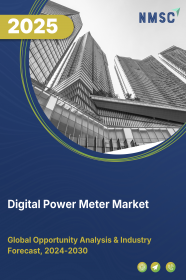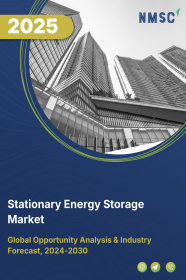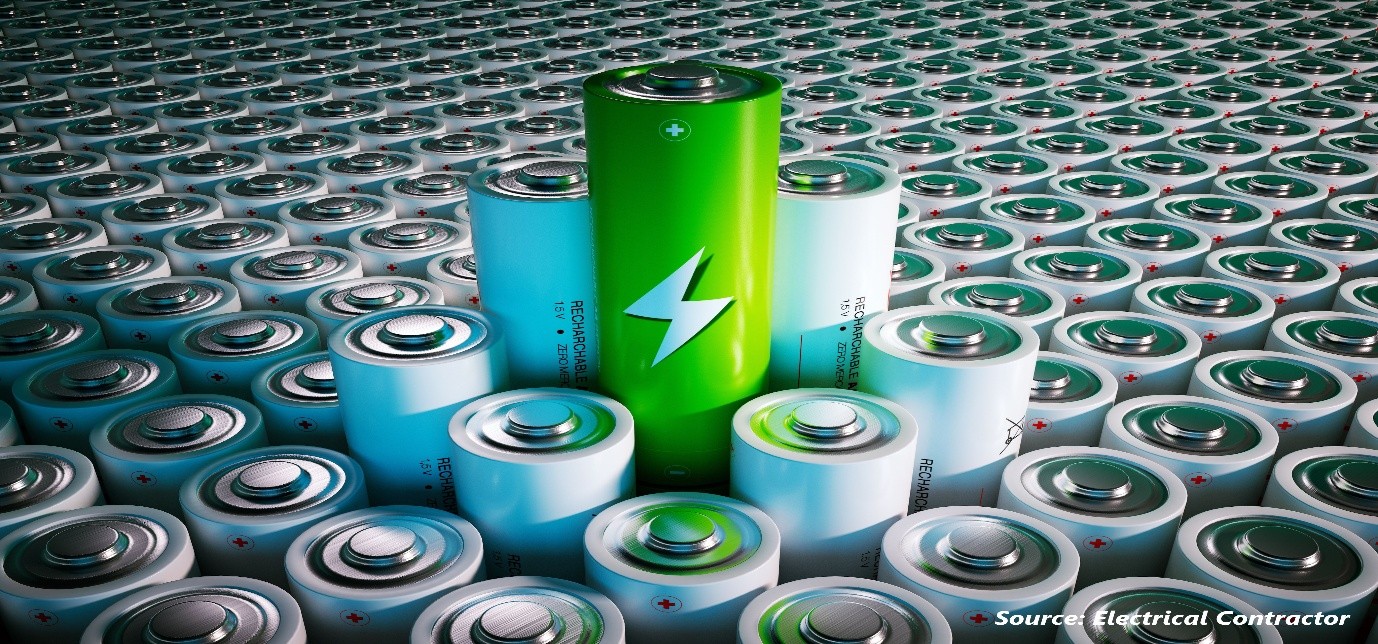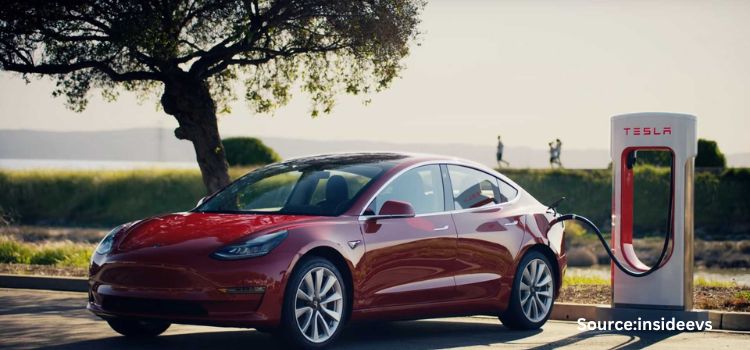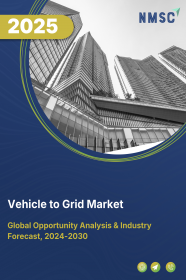
Vehicle to Grid Market by Components (Electric Vehicle Supply Equipment (EVSE), Smart Meters, Home Energy Management (HEM), and Others), by Vehicle Type (Battery Electric Vehicles, Plug in Hybrid Electric Vehicles, and Fuel Cell Vehicles (FCVs)), by Technology (Power Management and Software), by Charger Type (AC Charger and DC Charger), and by Application (Peak Power Sales, Spinning Reserves, Base Load Power, and Others) – Global Opportunity Analysis and Industry Forecast 2025-2030
US Tariff Impact on Vehicle to Grid Market
Trump Tariffs Are Reshaping Global Business
Vehicle to Grid Market Overview
The Global Vehicle to Grid Market size was valued at USD 4.01 billion in 2024 and is predicted to reach USD 27.51 billion by 2030 with a CAGR of 38.4% from 2025-2030.
The vehicle to grid market size is driven by various factors such as rising adoption of electric vehicles (EV), various initiatives taken by government to develop EV infrastructure, and key strategies adopted by the dominating players. The market is however, hindered by the high upfront cost but, on the other hand, the market is anticipated to show prosperous future opportunity due to introduction of smart grid technology.
Additionally, few key players such as Nissan Motor Corporation, Ltd. Toyota Kirloskar Motor, AB Volvo are embracing different business approaches such as forming alliance and launch of product to maintain their leadership in the industry.
Rising Adoption of EV Drives the Market Growth
The surge in the adoption of electric vehicles drives the demand for efficient charging systems for the vehicles including V2G, thereby boosting the market growth. As per the report published by the Internation Energy Agency, the sales of electric vehicles (EVs) summed 14 million in 2023 reflecting a 3.5 million more than in 2022, a 35% year-on-year increase. Such rise in the sales of EVs increases the demand for V2G technology to support efficient charging leading to vehicle to grid market growth.
Initiatives Taken by Government to Develop EV Infrastructure Accelerates the Market Growth
The various initiatives undertaken by governments worldwide to develop EV infrastructure are driving market growth. According to the government of U.K report, the government launched an initiative for the establishment of electric vehicle charging station with an aim to end the sale of petrol vehicles by 2030.
Furthermore, the report published by the government of Australia in 2025 states that the investment in EV infrastructure summed USD 2.4 million with anticipated installation of 250 kerbside chargers. This surge in funding in EV infrastructure prompts manufactures to adopt latest and advanced features including V2G to enhance the efficiency and functionality of EVs and supports broader integration of renewable energy into the grid, fuelling the vehicle to grid market growth.
Partnership by the Dominant Players Boosts the Market Growth
The market is driven by the presence of global companies such as Nissan Motor Corporation, Honda Motor Corporation and Mitsubishi Motors Corporation who are embracing various business tactics such as partnership to enhance the grid functionality and stability.
For instance, in July 2024 Nissan Motor Corporation formed alliance with Faculty of Engineering, Chulalongkorn University, Electricity Generating Authority of Thailand (EGAT), and Haupcar Company Limited to launch vehicle to grid project. Such developments by the players to develop advanced grid features and offer benefits to the EV owners plays a vital role in accelerating the use of V2G technology and promoting a stronger and more efficient energy system.
High Initial Cost Hinders the Market Growth
The high initial cost of integrating grid technology into EV charging systems hinders the market growth.
Introduction of Smart Grid Technology Creates Future Opportunities for the Market Growth
The introduction of smart grid technology in V2G market is anticipated to create significant future opportunity in the market. Smart grid technology fuses the electrical grid with digital communication and automation making it more efficient along with dependable and renewable. It includes advanced meters as well as renewable energy integration and grid automation to optimize performance and enhance the power distribution network.
Market Segmentations and Scope of the Study
The vehicle to grid market report is segmented by components, vehicle type, technology, charger type, application, end users and region. On the basis of components, the market is classified into electric vehicle supply equipment (EVSE), smart meters, home energy management (HEM), and others. On the basis of vehicle type, the market is segmented into battery electric vehicles, plug in hybrid electric vehicles, and fuel cell vehicles (FCVs). On the basis of technology, the market is segregated into power management and software. On the basis of charger type, the market is divided into AC charger and DC charger. On the basis of application, the market is grouped into peak power sales, spinning reserves, base load power, and others. On the basis of end users, the market is classified into residential and commercial. Regional breakdown and analysis of each of the aforesaid segments includes regions comprising of North America, Europe, Asia-Pacific, and RoW.
Geographical Analysis
North America holds the dominant position in the V2G market share and is forecasted to hold its dominance during the forecast period. This is due to government's initiatives such as tax credits and rebates to boost adoption of EVs. The U.S. government initiated a USD 7,500 tax credit program for purchasing EV from 2023 onwards as per the U.S. Department of Energy. Such organizational subsidies improve EV adoption and fuels demand for V2G technology promoting growth in the market.
Additionally, the market is also driven by the presence of key companies such as BC Hydro, Nissan Motor Corporation and Honda Motor Corporation are embracing business approaches such as expansion of business. For instance, in December 2023, BC Hydro announced the commencement of V2G project in Canada for medium and heavy-duty EVs.
The project, led by BC Hydro, complements on developing grid that enable electricity to be pushed back to the grid from the batteries of EVs such as buses and transport trucks. Such product launches by notable companies’ aids accelerate the V2G adoption in the region and leverages their expertise as well as resources and influence to advance the technology's development and integration.
Conversely, Asia-Pacific is anticipated to witness the fastest growth in vehicle to grid market share during the forecast period due to surge in adoption of EV in the countries such as China, India and Japan.
The sale of electric car in China summed 8.1 million in 2023, an increase of 35% relative to 2022 as per International Energy Agency. The increase in adoption of EV fuels the demand for V2G technologies as these technologies complements bidirectional flow of energy that upgrades grid stability and complements sustainability.
Moreover, the implementation of various government policies toward EV manufacturing to attract investments of global and domestic manufacturers in this region boosts the market growth. As per the Ministry of Heavy Industries, the Indian government implemented e-vehicle policy with aim to promote India as a manufacturing hub for EV.
The surge in EV manufacturing fuels the demand for V2G technology for energy management that enables more efficient energy exchanges between vehicles and the grid, thereby fuelling the market growth.
Competitive Landscape
Various key players operating in the vehicle to grid industry are OVO Energy Limited, Nuvve Holding Corp., Toyota Kirloskar Motor, Wallbox Chargers, Groupe Renault, Nissan Motor Corporation, Ltd., NRG Energy Inc., Virta Global, E. ON UK plc., AB Ltd., The Mobility House GmbH, Flexitricity, Edison International, Synop, NTT Data Group Corporation, and others. These market players are adopting various strategies such as product launch and partnerships to remain dominant in the market.
For instance, in July 2024, Nissan Motor Corporation, Ltd. formed alliance with Faculty of Engineering, Chulalongkorn University, Electricity Generating Authority of Thailand (EGAT) and Haupcar Company Limited to launch V2G project. The project complements creating a pollution free society and improving people's lives through using electric vehicles and technological innovation.
Moreover, in June 2024, Toyota Kirloskar Motor merged with Potomac Electric Power Company to research on V2G technology for EV battery advancement. Such collaborative efforts aim on researching bidirectional power flow technology enabling EV owners to charge their vehicles at off-peak times and return power to the local grid when demand is high.
Furthermore, in November 2023, AB Volvo, launched Volvo Cars Energy Solutions unit for smart charging and grid support with bi-directional EV technology. The launch focuses on offering energy storage and charging-related technologies and services, including bi-directional charging that allows electric cars to contribute excess battery power to the grid.
Key Benefits
-
The report provides quantitative analysis and estimations of the industry from 2025 to 2030, which assists in identifying the prevailing market opportunities.
-
The study comprises a deep-dive analysis of industry including the current and future trends to depict prevalent investment pockets in the market.
-
Information related to key drivers, restraints, and opportunities and their impact on the industry provided in the report.
-
Competitive analysis of the players, along with their market share is provided in the report.
-
SWOT analysis and Porters Five Forces model is elaborated in the study.
-
Value chain analysis in the market study provides a clear picture of roles of stakeholders.
Vehicle to Grid Market Key Segments
By Component
-
Electric Vehicle Supply Equipment (EVSE)
-
Smart Meters
-
Home Energy Management (HEM)
-
Others
By Vehicle Type
-
Battery Electric Vehicles
-
Plug in Hybrid Electric Vehicles
-
Fuel Cell Vehicles (FCVs)
By Technology
-
Power Management
-
Software
By Charger Type
-
AC Charger
-
DC Charger
By Application
-
Peak Power Sales
-
Spinning Reserves
-
Base Load Power
-
Others
By End Users
-
Residential
-
Commercial
By Region
-
North America
-
The U.S.
-
Canada
-
Mexico
-
-
Europe
-
The UK
-
Germany
-
France
-
Italy
-
Spain
-
Denmark
-
Netherlands
-
Finland
-
Sweden
-
Norway
-
Russia
-
Rest of Europe
-
-
Asia-Pacific
-
China
-
Japan
-
India
-
South Korea
-
Australia
-
Indonesia
-
Singapore
-
Taiwan
-
Thailand
-
Rest of Asia-Pacific
-
-
RoW
-
Latin America
-
Middle East
-
Africa
-
Key Players
-
OVO Energy Limited
-
Nuvve Holding Corp.
-
Toyota Kirloskar Motor
-
Wallbox Chargers
-
Groupe Renault
-
Nissan Motor Corporation, Ltd.
-
NRG Energy Inc
-
Virta Global
-
E. ON UK plc.
-
ABB Ltd.
-
The Mobility House GmbH
-
Flexitricity
-
Edison International
-
Synop
-
NTT Data Group Corporation
REPORT SCOPE AND SEGMENTATION:
|
Parameters |
Details |
|
Market Size in 2024 |
USD 4.01 billion |
|
Revenue Forecast in 2030 |
USD 27.51 billion |
|
Growth Rate |
CAGR of 38.4% from 2025 to 2030 |
|
Analysis Period |
2024–2030 |
|
Base Year Considered |
2024 |
|
Forecast Period |
2025–2030 |
|
Market Size Estimation |
Billion (USD) |
|
Growth Factors |
|
|
Countries Covered |
28 |
|
Companies Profiled |
15 |
|
Market Share |
Available for 10 companies |
|
Customization Scope |
Free customization (equivalent to up to 80 working hours of analysts) after purchase. Addition or alteration to country, regional, and segment scope. |
|
Pricing and Purchase Options |
Avail customized purchase options to meet your exact research needs. |

















 Speak to Our Analyst
Speak to Our Analyst



